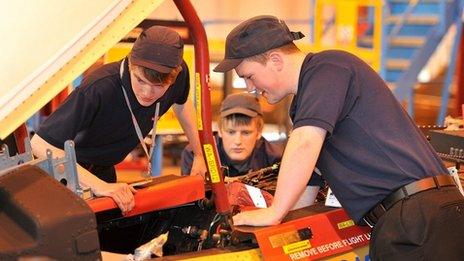Warning on lack of careers advice
- Published

There are calls for improvements in the availability of careers lessons
Careers services for young people in England need to be urgently improved, says a report from an advisory body set up by the government.
The National Careers Council, which has been investigating the current state of careers provision, highlights a lack of consistency and availability.
It warns too many youngsters do not get the advice they need about work.
Deirdre Hughes, who chaired the council, said a "culture change in careers provision was urgently needed".
The report from the National Careers Council says there are "massive variations" in the advice available, depending on where young people live.
It says in one region there are 134 careers advisory services, and in another there is only one.
'Slow progress'
There are also concerns that the National Careers Service has been structured to focus mainly on the needs of adults, leaving a gap in school-age advice services.
The service provides over a million face-to-face advice sessions for adults, but there is no provision for such individual advice for young people.
Instead young people are offered phone advice lines and online information.
The council says that it has been "disappointed with the slow progress" in improving careers services for young people.
It calls for the setting up of an employer-led advisory body to supervise creating a better careers advice system.
And it calls for the government to give all schools free or subsidised access to "independent and impartial career development".
It suggests there should be a fund to invest in successful models of careers advice so that they can be spread more widely in other schools and regions.
There have been a series of critical reports about the quality of careers provision and doubts over the decision to transfer responsibility for careers advice to individual schools.
"It is worrying that the new arrangements are failing to provide good guidance," said Ofsted chief Sir Michael Wilshaw last year, when the education watchdog warned that too few schools had the skills to provide good quality advice.
'Lottery'
The Education Select Committee also reported last year that careers services were showing a "worrying deterioration".
Neil Carberry, of the CBI, said: "The shift of responsibility for careers advice to schools has been a failure. Schools, government and businesses all have a role to play in fixing the problem, it cannot be shouldered by schools alone."
Brian Lightman, general secretary of the Association of School and College Leaders, said schools had been working hard to provide careers advice, but "many are finding it extremely difficult".
"A stark postcode lottery is putting many young people at a real disadvantage," said the head teachers' leader.
"Far too many young people are having to make vital and incredibly important decisions about their futures without access to good and reliable information," said Nick Chambers, director of the Education and Employers Taskforce charity.
Deirdre Hughes, who chaired the group that produced the report, said: "Some progress has been made in the last 12 months, but this has been far too slow.
"Meanwhile, our education and labour markets remain complex and confusing for young people, parents and teachers, and there are significant costs associated with this.
"We urge government and others to take action across England to halt the rapid decline in careers services for young people."
Labour's shadow education secretary, Tristram Hunt, said of the careers service: "There is surely no other policy agenda where the government has so miserably failed our young people."
He said he would reverse the decision to make work experience placements optional and would want every school to have a governor responsible for developing links with local businesses to help build provide careers advice and experience of the world of work.
- Published10 September 2013
- Published23 January 2013
